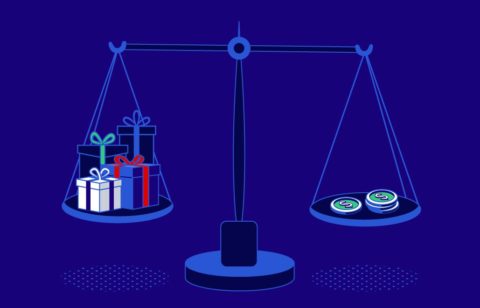As the saying goes, “Money makes the world go around.” At the very least, it pays for those things you want and need in life. Without money, you essentially couldn’t live. You wouldn’t be able to pay your bills, build savings or cover essentials like insurance and your home. But if you don’t budget properly, you could find yourself with empty pockets and a mailbox full of past-due bills.
To develop better money management skills, you should first understand the different ways your money can be put to good use. Since most of us are not living with unlimited means, this knowledge can help you spend wisely and live comfortably.
Money management is an important skill because it helps you avoid a lot of financial pitfalls. Keeping tabs on your spending can protect you from falling into debt and enable you to grow your net worth, no matter how much or how little you earn.
4 uses of money and how to accomplish each one successfully
Here is a breakdown of the 4 most important ways to put your money to good use:
Spending
Americans have perfected the art of spending. Whether it’s $200 sneakers or a 70-inch smart TV, we live in a society of immediate gratification. Even those who try to live frugally still need money to fund their simple lifestyle.
Sometimes, we spend what we don’t have by using credit for something we want but don’t necessarily need. This, of course, is the opposite of smart spending. It can force you into debt and saddle you with high-interest charges on your purchases.
Being a smart spender entails spending only what you can afford. If you choose to charge because you don’t have the cash, it’s usually better if you forego that item. Or you can cut other things to cover the purchase.
If you don’t have the cash, the item you’re financing had better be worth it. And no, the latest iPhone is not an essential item when your current phone works just fine. An emergency like a medical bill, on the other hand, is an exception to the rule.
According to Forbes, consumers in America will keep spending in 2022 despite inflation running higher than wage gains. Average hourly earnings increased 6.5% over the past 12 months, but the consumer price index rose 8.2%.
Whenever possible try to rein in your spending, especially if it digs you deep into debt. There is nothing wrong with enjoying your hard-earned money, but being aware of discretionary spending is the best way to avoid financial mistakes and unnecessary purchases you’ll later regret. Try not to be wasteful so that you have more to use on the following three categories.
Saving
We all know that saving is important, but not everyone knows how to go about it. Granted, it’s not always easy to sock money away when you’re living on a limited budget. But if you don’t have a savings account, a large emergency can lead to total financial failure.
Make sure you keep enough money in a savings account for a potential emergency. Many experts suggest at least enough to cover six months of your expenses.
If you are having trouble saving, take steps to make the process easier. For example, you can have money from each paycheck automatically transferred into a savings account. If you never see it, you won’t miss it.
If you purchase an item and receive a $100 discount, that extra money should not be considered actual savings until you deposit it in a savings account. This should be your mindset if you want to be smart about saving for now and the future.
If you have additional cash even after socking some money away, consider investing part of it.
Investing
Keeping money in a savings account is always a smart strategy. But the interest rate is minimal compared to what you could potentially earn through an investment account. If you are looking to grow your money, investing is a good way to do it. The younger you are, the more time you have to build your account.
Just remember that while investing offers the potential for gains, it also comes with the possibility of losses. Know the risks – and your individual risk tolerance – before you invest.
Giving
Giving some of your money away is the one thing on this list that will not benefit you financially. However, it offers the biggest pay off in terms of karma, helping society and feeling good about your contribution.
Donating allows you to share your blessings with people who need them the most. You can give to charities, a homeless person you pass by every day, or even a relative in need. The list is endless. And your good deed may pay off at tax time with a tax deduction. If you don’t have cash to spare, volunteering your services is another way to make a difference.
Americans are generous: They gave $484.85 billion to charity in 2021, up 4% from 2020, according to the National Philanthropic Trust.
You can’t put a price on the feeling of being able to help someone through their toughest time. Even if you only have a little to give, the thought counts a lot.
Rules that help you manage your money wisely
Your style of spending says a lot about your personality and the type of lifestyle you want to live. Regardless of how much money you have, staying out of debt should be your top goal. Making smart financial decisions will lead the way.
Here are four tried and true rules when it comes to your money:
Always have a plan.
It’s difficult to make smart financial decisions without a strategy. A financial plan provides a clear roadmap of your current financial situation and what you can afford moving forward. Following a budget is a good example.
Know the “why” in every decision.
While impulse decisions sometimes work, they more often lead to regret. So, know exactly why you are making a purchase and ask yourself if it’s necessary. If it isn’t and you’re tight on money, just walk away.
Consult your numbers.
Before making a purchase, especially a big one, always run the numbers. This refers to your income and its relationship to your expenses. The rule of thumb is to always keep your expenses below your income.
Follow your intuition.
Finally, you need to learn how to trust your intuition when making important spending decisions. If you know in your heart that a purchase is necessary, go for it. Reckless decisions like buying a larger TV on a whim will usually backfire. While the short-term effect is often the main consideration, you should never ignore the long-term effects on your wallet.







